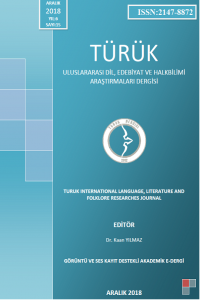EBÜLFEZ ELÇİBEY’İN YAKLAŞIMIYLA FARABİ
Farabi, İslam felsefesinde özel bir yeri olan Türk filozofudur. İslam felsefe geleneğinin en parlak temsilcilerinden biri olan Fârâbî ilmi ve felsefi disiplinlerin hepsine dair çalışmalarda bulunmuş ve bunları bir potada eritmeye gayret etmiştir. Hem felsefe ile din arasında hem de felsefenin alt disiplinleri arasında bir birlik ve uyum oluşturmaya çalışmıştır. Çabalarıyla İslam’da yeni bir felsefi akımı temellendirmiştir. Fârâbî’nin döneminde tartışılan ontoloji, mantık, epistemoloji, ahlak, estetik vb. konularda yaptığı yapıtlarla Aristoteles’in ardılı olarak ikinci öğretmen (el-mu’allimü’s-sânî) unvanını almış bir düşünürdür. Bu çalışmamızda Ebülfez Elçibey’in bakışıyla Farabi ve düşünceleri ele alınacaktır.
FARABİ WİTH EBULFEZ ELCHİBEY'S APPROACH
Farabi, a special place in Islamic Philosophy, Turkish philosopher. Philosophy in the Islamictradition, which is one of the most brilliant representatives of the scientific and philosophicaldisciplines, all of the studies found in Farabi and was keen to melt them in a pot. Bothsub-disciplines of philosophy and philosophy of religion as well as between a union andworked to create harmony. Islam has laid the foundations for a new philosophical currentefforts. Farabi discussed during the ontology, logic, epistemology, ethics, aesthetics and so on. Matters as the successor of Aristotle, his masterpieces, the second teacher (secondteacher) took the title of a thinker. In this study, Abulfaz Elchibey's view of al-Farabi and ideas will be discussed.
___
- BÜNYADOV, Z., Azerbaycan VII-IX yüzyıllarda., Bakü, 1965, s. 238 (Rusça).
- İBN XELLİQAN, Vafeyet el-ileri, RAF, yazma D-165, vereq 188 ab veya Mısır basımı, 1289h, II cilt, s. 499-500.
- QAMUS TERCÜMESİ, İstanbul, 1305h, IV cilt, s. 823.
- ZEKUYEV, A. K., En-Nezzam Felsefesi, Bakü, 1961, s. 16 (Rusça).
